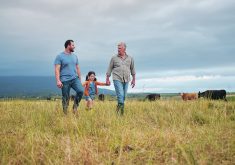Certain issues within the transition planning process might cause difficulties for some families. These challenges are often referred to as the ‘soft’ issues. They can be more difficult to deal with than the ‘hard’ or concrete issues such as taxation.
I recently was in a farm family meeting about transitioning ownership and management when a couple of common challenges arose.
Fair versus equal
Equal is not always fair and fair is not always equal.
This principle applies to the distribution of estate value, ownership and management transfer and the division of labour.
Read Also

Know what costs are involved in keeping crops in the bin
When you’re looking at full bins and rising calf prices, the human reflex is to hold on and hope for more. That’s not a plan. It’s a bet. Storage has a price tag.
Parents often find it difficult to come to terms with treating their children fairly through the implementation of the plan, sometimes becoming stuck when trying to treat children equally.
Equal is virtually impossible unless all assets are converted to cash, which would mean that the farm is sold outright.
In transition planning, fair and equal only has to make sense to the retiring generation. They’ve taken the risks and built the business to where it is today. They should get to decide what they want to do with it.
That is easy to say but not so easy to do.
Each family should work to find a balance between fair and equal and to understand what it means to them. It’s possible to arrive at equitable arrangements but this principle is different than trying to achieve an equal arrangement.
Interestingly, the siblings of the family I was meeting with, were significantly more concerned about ‘fair and equal’ when discussing work-related expectations than they were with money.
They trusted that their share of the estate would be fair. But their own family situations were different. Their children were at different ages and spouses had career aspirations outside the farm.
The discussion moved to what the work expectations were. Discussion was robust. Consensus and agreement tricky.
The issues became more involved as the discussion proceeded.
It moved to include discussion about priorities. Was their farm a ‘business first or family first’ organization?
They agreed to continue with the discussion, and as part of the process to come to a satisfactory conclusion and outcomes, to develop a comprehensive list of what the work expectations were and how individuals were going to be held accountable.
They acknowledged that their situations were not static and recognized the need to make sure that they adjust expectations as things changed within the farm and within their family units.
The discussion led to other, related issues such as entitlement.
Entitlement
Feelings of entitlement are common in transition planning. It’s often difficult for children and siblings to openly share their opinions on entitlement, either because the opinions are not well thought through or because they simply are not comfortable in voicing them.
I think statements like “this is what I think I should get” can sound greedy and in fact, likely are contrary to core values held within the family.
The discussion within the family about fair and equal in terms of work expectations spilled over to entitlement.
One of the siblings said they expected that if they worked more, they should be entitled to a different share of certain aspects of the estate. It was clear that the comment was not made from a greed orientation. It wasn’t tied to any financial value.
The logic provided was that “if I work more, then I should be entitled to something in return.”
Children who have been working on the farm will often feel entitled to a greater share of the farm and their parents’ estate than siblings who have not.
Siblings who have not been working on the farm can feel entitled to their share through birthright. These feelings must be acknowledged, balanced and incorporated into the transition plan.
A first step is for all family members to develop and share goals and to come to agreement on what they are working towards – the vision for the future. What is it that they want to achieve personally, for their families and for the business?
Goals and vision help to set the foundation for transition plan development and implementation.
They become the common interest from which to proceed with planning and help families work through challenging issues such as entitlement and fair and equal.
Terry Betker is a farm management consultant based in Winnipeg. He can be reached at 204-782-8200 or terry.betker@backswath.com.














